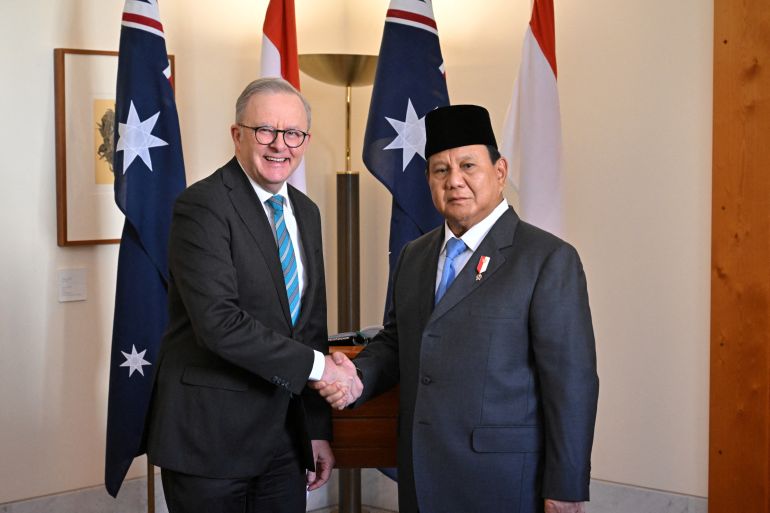Indonesia and Australia finalise ‘significant’ defence pact
The move comes as Indonesia’s president-elect Prabowo Subianto prepares to take office later this year.
Indonesia’s president-elect Prabowo Subianto meets with Australia’s Prime Minister Anthony Albanese at Parliament House in Canberra, Australia, on August 20 [Mick Tsikas via Reuters]Published On 20 Aug 202420 Aug 2024
Australia and Indonesia have finalised a new defence pact, cementing closer ties between the countries as Prabowo Subianto prepares to take office as Indonesia’s next president in October.
The details of the defence agreement, which has been in the works since February 2023, have not been announced. It is believed to include provisions for joint military drills, deployments to each country, and greater maritime cooperation in the disputed South China Sea.
Keep reading
list of 3 itemsend of list
Prabowo, who is presently defence minister but is set to become leader of the world’s third-largest democracy on October 20, is currently on a two-day official visit to Australia.
The deal will officially be signed within days when Australia’s Minister for Defence Richard Marles visits Jakarta.
Speaking to reporters at Australia’s Parliament House in Canberra following a meeting with Prime Minister Anthony Albanese, Prabowo described the deal as a “very good outcome”, adding that it would be “beneficial to both our countries in the future”.
He also expressed a desire for greater cooperation with Australia on issues beyond defence, including the economy, food security, agriculture, and curbing international drug trafficking.
“We would like to see more Australian participation in our economy,” he said. “I am determined to continue this good neighbour relationship … Australia plays a very important role for us.”
An Australian Department of Defence statement said Albanese and Marles met Prabowo and discussed “Australia’s continued commitment to working in partnership with Indonesia on shared economic, security and net zero transition priorities”.
Marles described the defence pact as one of the most significant agreements ever negotiated between the countries, saying the countries were “working closer together than we have before”.
“What this agreement will do is provide for much greater interoperability between our defence forces, it will provide for much more exercises between our defence forces, it will see us working together the global commons to support the rules-based order and, importantly, it will allow us to operate from each other’s countries,” he told reporters.
“In that sense, this agreement will be the deepest, the most significant agreement that our two countries have ever made.”
A stronger interest in foreign affairs is anticipated under Prabowo, an ex-special forces commander in Indonesia’s military, than with outgoing President Joko Widodo, who has never attended the United Nations General Assembly in New York and rarely conducts interviews in languages other than Indonesian.
However, concerns remain over Prabowo’s human rights record. The 72-year-old former son-in-law of Soeharto, Indonesia’s long-ruling authoritarian president between 1967-98, was dismissed from the military in 1998 for kidnapping student activists.
Prabowo was also indicted for alleged atrocities in East Timor in 1983, then occupied by Indonesia after a UN-sponsored report accused him of leading the massacre of as many as 200 Timorese men. Prabowo has denied the accusations.
Daniela Gavshon, Australia director at Human Rights Watch, called on Albanese to press Prabowo about Indonesia’s chequered human rights record, including on religious freedom and LGBTQ rights.
“Australian leaders should not let Prabowo’s egregious rights record deter them from forcefully raising current human rights concerns,” she said. “They should emphasise that the new president has an important opportunity to restore Indonesia’s standing on West Papua and other human rights issues.”
